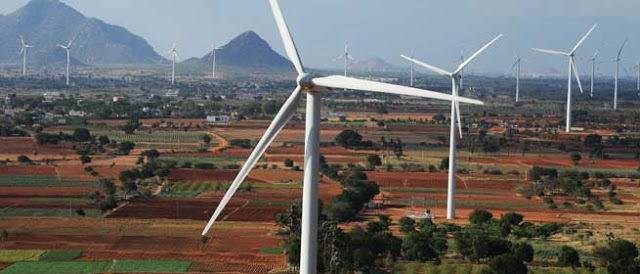India could become a key player in the global wind energy supply chain, according to the report From local wind power to global export hub: ‘India Wind Energy Market Outlook 2023-2027’ published today by the Global Wind Energy Council (GWEC) and MEC Intelligence (MEC+).
The report emphasises the huge supply chain opportunities for India in the export market, and looks at the domestic challenges of ramping up deployment of wind energy in this decade to meet ambitious targets. The report forecasts that around 22 GW of wind energy capacity will be added in India over the next five years, at the current pace of growth. Under an accelerated growth scenario with heightened demand from central and state markets, as well as commercial and industrial consumers of clean energy, more than 26 GW could be added within this period.
The Government of India is targeting 140 GW of cumulative installed wind energy capacity by 2030, though various factors make it more likely that around 100 GW of capacity will be achieved by the end of the decade. The projected shortfall can still be avoided, but this will require proactive policy and industrial strategy support to help accelerate growth.
“India has an enormous strategic opportunity to leverage an invigorated domestic market and its existing wind manufacturing base and knowledge to become a key player in the global wind supply chain”Ben Backwell, CEO, GWEC
Ben Backwell, CEO of GWEC said: “The leadership already demonstrated by the Government of India to enable the expansion of wind energy in the country’s electricity mix is commendable. The potential is there for even more, and proactive policy support could enable more than 68 GW of total wind energy installed in India by 2027.
“India has an enormous strategic opportunity to leverage an invigorated domestic market and its existing wind manufacturing base and knowledge to become a key player in the global wind supply chain. This would establish the country as a renewable industrial hub in Asia and beyond, advancing climate action across the globe.”
India’s leadership as part of its G20 Presidency and at the forthcoming COP28 in Dubai give the country a crucial role in determining global action to expand renewable energy towards a net zero energy system. The rapid acceleration of wind energy deployment across regions must be an integral element of the way forward.
“Wind Power will continue to play an important role in the global energy transition in the coming decade,” said Sumant Sinha, Chairperson GWEC India and Founder, Chairman and CEO, ReNew, adding, “India, with an extremely conducive policy environment under the current government, a fairly advanced manufacturing supply chain and growth of new opportunities like the C&I business and offshore wind, is uniquely positioned to play an important role in helping the world meet its ambitious 2030 targets”
The India Outlook from GWEC and MEC+ highlights that in 2022, 10.4 GW of tenders were issued for standalone wind and hybrid projects. This followed the reopening of state tenders for standalone and hybrid wind, which were nearly dormant for the past few years after the introduction of the e-reverse auction regime.
Sidharth Jain, MD, MEC+ said: “India’s wind power sector stands at an inflection point looking at multiple opportunity areas. With a growing domestic market and evolving global supply chain dynamics, Indian companies have exciting prospects to serve the global demand for wind equipment supply. Amidst rising domestic volumes and aligned policies, the Indian market expanded significantly in 2022, awarding 4.7 GW tenders. Promisingly, 3.5 GW tenders have been awarded, and 5 GW more announced for 2023. In parallel, new horizons like offshore wind and the hydrogen ecosystem fuel growth towards a 10 GW wind market by 2030, practical estimates place it at 5 GW due to challenges like policy transmission delays and infrastructure constraints.
“India’s strategic geopolitical position and scale make it a prime candidate to develop as a global supply chain hub, provided the industry shores up competitiveness. This report aims to examine the facts, offering insights and recommendations to guide the industry’s trajectory.”
Kane Xu, Chairman, Envision Energy India said “The India Wind Energy Market Outlook 2023-2027 provides valuable insights into the Indian wind energy landscape. By fostering extensive collaboration between the government, industries, and institutions, the adoption of wind energy can be accelerated. The upcoming decade offers a pivotal window for the Indian wind industry to translate intentions into tangible actions. Together, we can make significant strides toward reaching the milestone of net-zero emissions!”.
Report highlights
- The Outlook outlines priorities for domestic wind growth and scaling up manufacturing and export capabilities for the wind sector:
- Aligning market demand trajectory with targets through supporting C&I segment, ensuring compliance in RPO
- Ensuring that the domestic market expands to encourage high volume and competitive production of tier-2 wind components and raw materials
- Creating Free Trade Agreements and refining tax and documentation procedures to get competitive access to raw materials and technologies
- Facilitating the ability to access resources required to build next-level models accommodating domestic and export market needs
- Review and upgradation of infrastructure to facilitate the transportation and storage of the large-sized components
- Nurture an offshore wind ecosystem that could boost India’s participation in the fast-expanding offshore wind sector in Asia
Martand Shardul, Policy Director-India, GWEC, said “I am delighted with the huge progress in India’s wind energy growth since 2014. Policy support has been key to recent progress, and that has lifted ambitions. Going forward, concerted efforts for translating a greater share of auctioned projects into active projects and consequently connected capacity is vital.”


